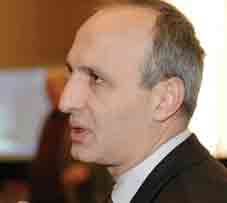Interior Minister testifies before War Commission
By Mzia Kupunia
Thursday, November 27

The Minister however told the Commission that he did not expect Russian military intervention in August. “If you had asked me on August 5 about the possibility of Russian aggression and military actions, I would have said that the possibility was 10%,” Merabishvili said.
The Interior Minister said some people outside the country assisted the Russians. He played the Commission another taped conversation, this time between the Russian General Borisov and former head of the Adjara Autonomous Republic Aslan Abashidze, who has been in exile in Russia since 2004. Minister Merabishvili said “this is just one example of who was helping the Russians.”
Merabishvili, whose hearing lasted about 3 hours, described in detail the situation in Upper Kodori Gorge (Upper Abkhazia) during the August war. He said he gave the order for the troops to leave the Gorge. He said there were just 300-400 policemen from the Interior Ministry, who were in danger of being seized by Russian and Abkhazian troops as he saw it. “That’s why I made the decision to retreat from the Kodori Gorge,” Merabishvili said.
The Interior Minister spoke about the reasons why Georgian troops entered Tskhinvali. He said that the Georgian side had 3 essential reasons for going in. “We wanted to defend the civilian population in the region, put the points we were being fired at out of action and stop the Russian troops, at least in Java,” Merabishvili said. He denied allegations that the Georgian side was shooting from tanks in Tskhinvali, damaging civilian targets and causing death to the peaceful population of Tskhinvali. Merabishvili stated that several tanks were used in the town, but only buildings occupied by the military were targeted.
Merabishvili denied the statements of the former Ambassador to Russia Erosi Kitsmarishvili, who testified before the Commission on Tuesday. Kitsmarishvili said that the Georgian Government had been planning a military operation in Abkhazia. “No military actions were to be carried out either in Abkhazia or South Ossetia by the Georgian side,” Merabishvili told the MPs. The Minister said he could not remember any case when Kitsmarishvili was present at meetings where military plans had been discussed. Merabishvili also denied the allegations of the ex-diplomat that the US had given a “green light” to the Georgian authorities to carry out the attack on Tskhinvali. “I don’t take Kitsmarishvili’s statements seriously. The Georgian Government has been cooperating with its foreign friends, however it does not mean that we are dependent on their “green light” when making decisions,” Merabishvili said. The Minister also denied that the appointment of Kitsmarishvili as Ambassador to Russia was initiated by him. “I have never offered him any post,” Merabishvili stated.
Merabishvili told the Commission that the patrol police had been working in a special regime during the conflict. “We decided to increase the number of fines we imposed and to make the policemen more strict. And I can say that these activities had positive results: the situation in terms of criminality did not worsen during the August conflict,” the Interior Minister said.
The Chairman of the Temporary Parliamentary Commission, Paata Davitaia, asked the Minister about the mistakes made by the Interior Ministry during the August conflict. Merabishvili avoided giving a direct answer, only saying that “the August events have been a lesson for me and I will try not to repeat them in future.” To the question whether it was possible to have avoided the conflict with Russia, Merabishvili answered that it had been possible only through “more active action from our Western friends and more pressure on Russia from international society.”
Today the Commission will question Defence Minister David Kezerashvili and former Deputy Foreign Minister and current Minister of Culture and Sports Grigol Vashadze.
